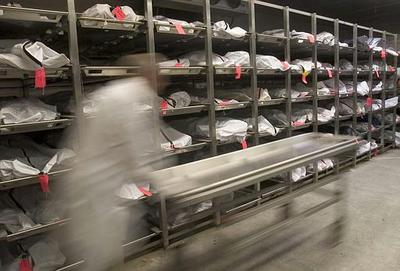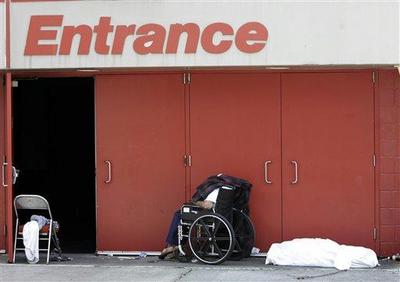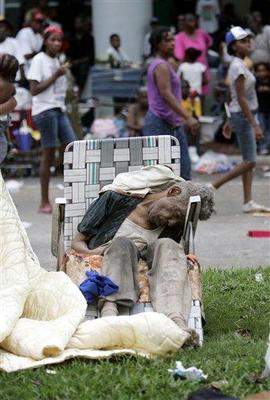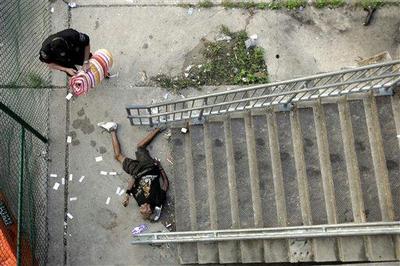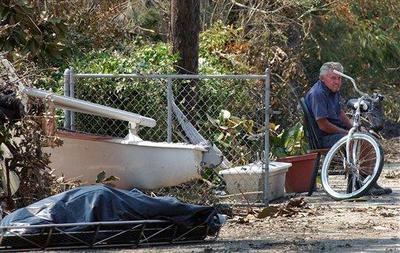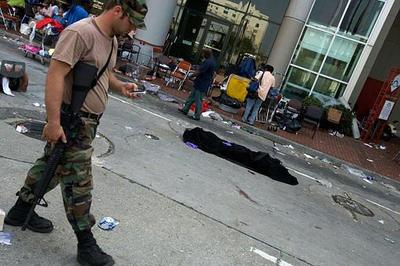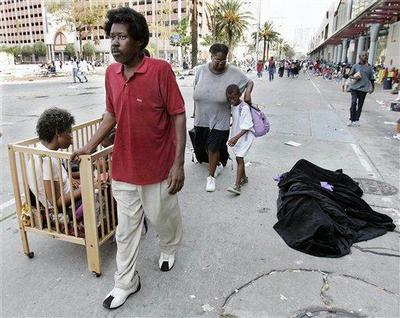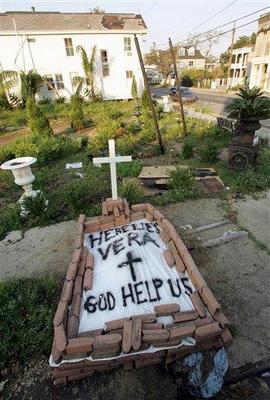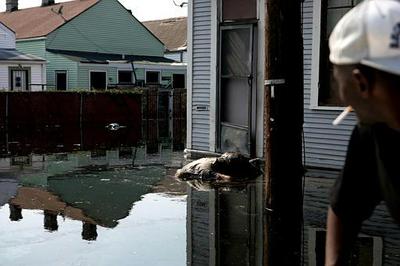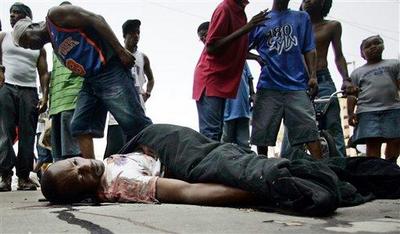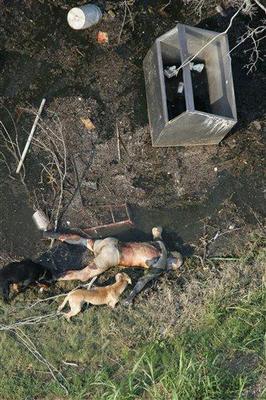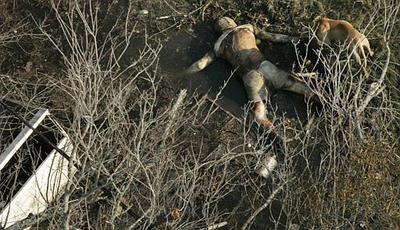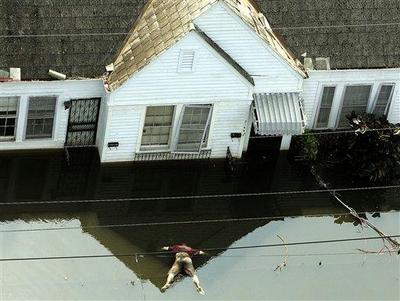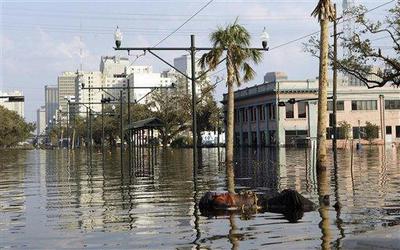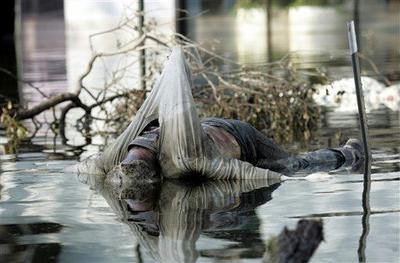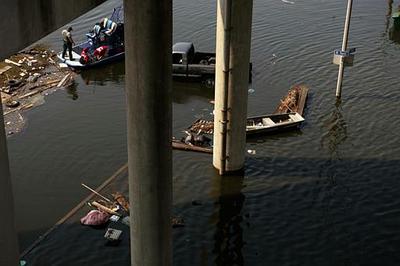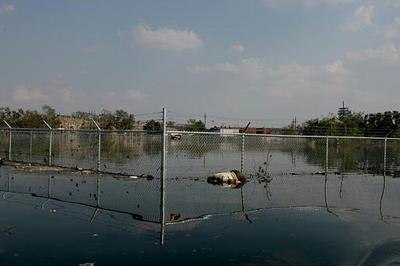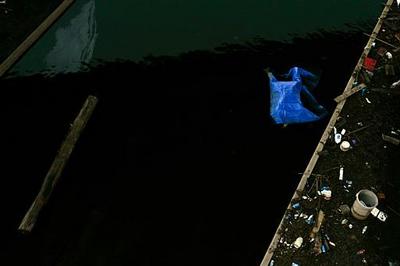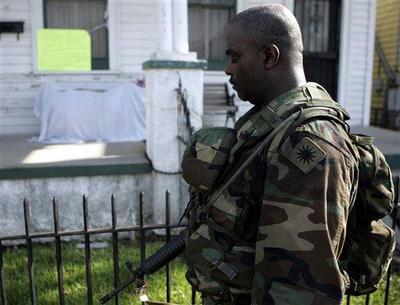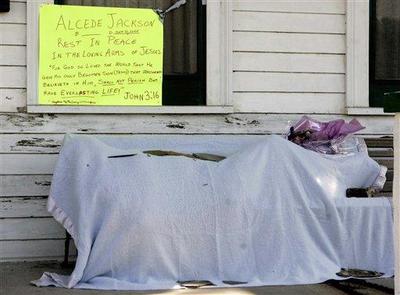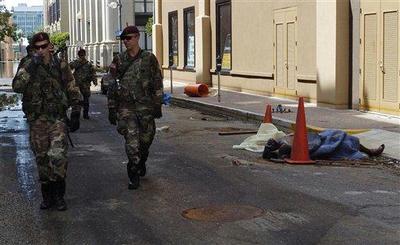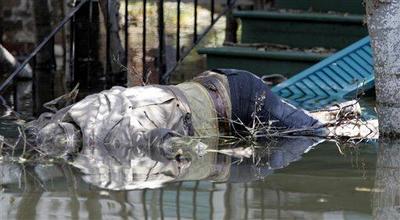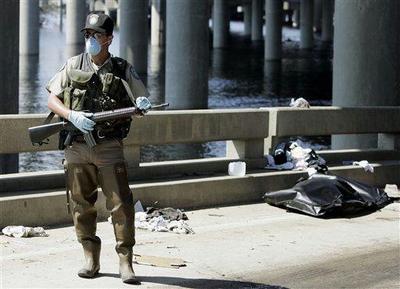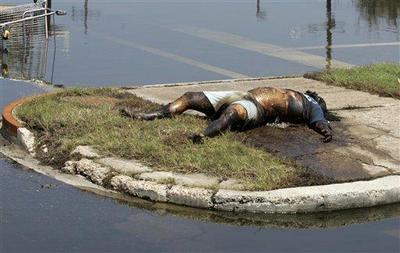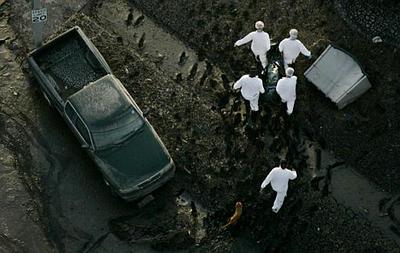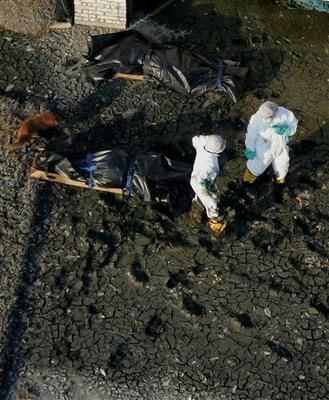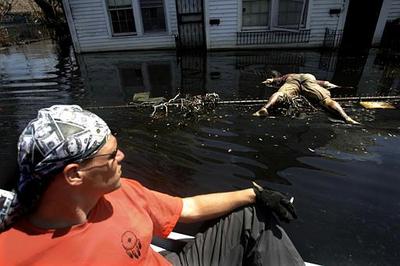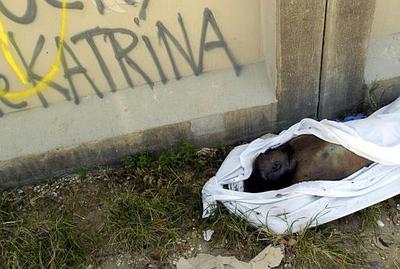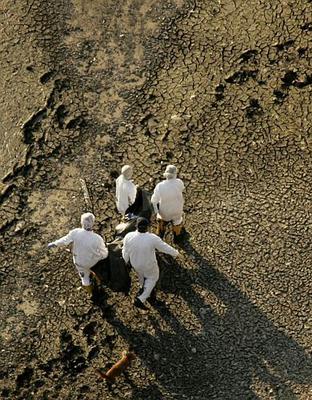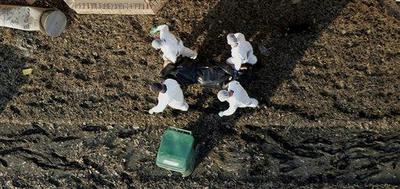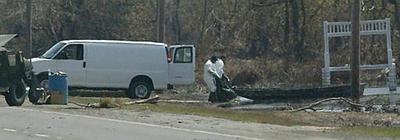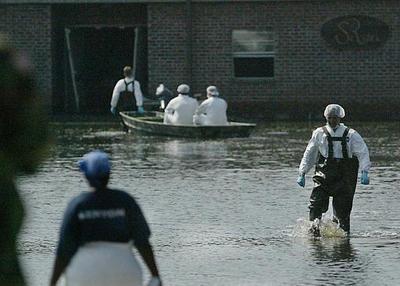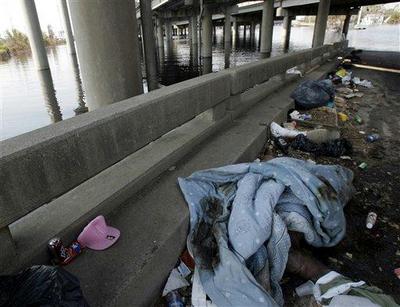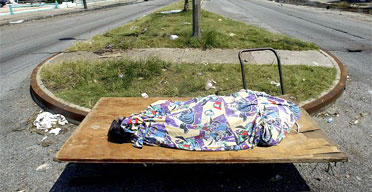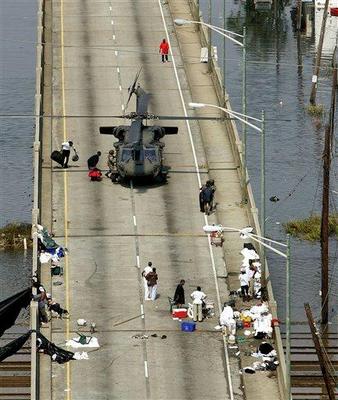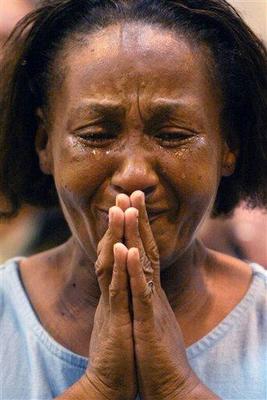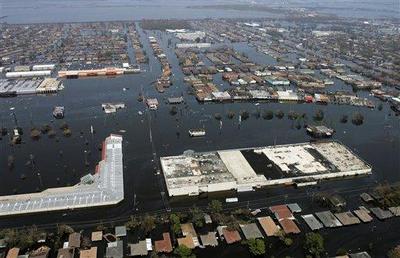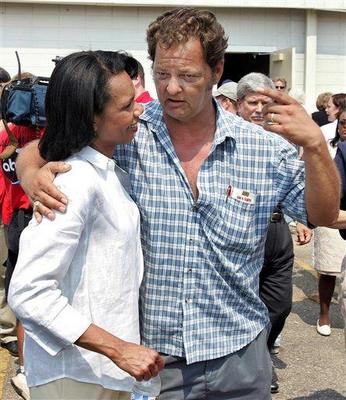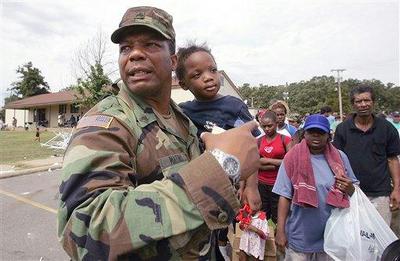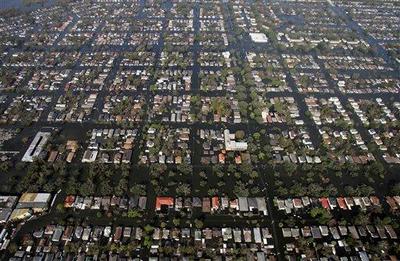Saturday, September 10, 2005
"Dame" Eliza Manningham-Buller says forget civil liberties, stopping terrorism is more important.
It really is sad that even those in charge of the top echelons of power haven't realised this is exactly what fundamentalists of all ilks want:
Her comments are rather measured, it has to be said. Shami Chakrabarti, head of Liberty, has said that her remarks are a lot more reasonable than those by politicians, especially the Prime Minister. Despite this, "Dame" Eliza is just as much the problem as she is the solution. Her organisation still refuses to allow wiretap surveillance evidence to be used in the courts as they fear it would expose their practices. It's ignorant decisions such as these that are leading to alleged extremists being deported to countries that practice torture, rather than trying them here. Secondly, the world has not changed. Only the politicians believe that the world has changed, in America more than elsewhere. They have seized on the terrorist attacks of the last few years to push their own agendas which were already well pre-planned. The gradual removal of rights, the use of identity cards and CCTV has grown massively year on year, with hardly any questions being asked, especially about the latter.
More than anything, we need to get terrorism into perspective. They (whoever they is) do not threaten the life of this nation. As Lord Bingham said, it's bad laws that threaten the life of the nation, not terrorists who only managed to kill 52 people with their pathetic attacks. That is not to belittle those who died. As I have said before, would those who died have wanted their deaths to be used as an excuse to limit civil liberties? We're not only rewarding the use of violence, we're also disrespecting their memory. Only by challenging beliefs, by not reducing those they view as their brothers to shreds in Iraq and Afghanistan, by pushing for a balanced solution to the Israel/Palestine conflict will we improve our safety. In the mean time, what is needed is improved intelligence on those in this country who do pose a threat, not draconian measures which impact on all of us.
The head of MI5, Dame Eliza Manningham-Buller, has publicly warned that civil liberties may have to be eroded to prevent future terrorist attacks in Britain.
Dame Eliza's decision to disclose her comments - first made at a private gathering in the Netherlands - is significant, given that she touches on a controversial issue at the heart of the government's political agenda.
Dame Eliza said she recognised rights had been hard fought for. "But the world has changed and there needs to be a debate on whether some erosion of what we all value may be necessary to improve the chances of our citizens not being blown apart as they go about their daily lives."
The MI5 head gave her warning in a speech in the Hague on September 1 to commemorate the 60th anniversary of the Dutch security service, the AIVD. She subsequently decided it should be published and it was posted yesterday on MI5's website.
Dame Eliza described what she calls a "central dilemma - how to protect our citizens within the rule of law when intelligence does not amount to clear-cut evidence and when it is fragile". It is in this context that she warned of the potential erosion of civil liberties.
Tony Blair has repeatedly asserted that the security services backed the government's system of control orders - restricting people's liberties without a trial in a court of law.
State prosecutors have also said that the 14 days the police can now hold suspect terrorists before they are charged or released is too short.
Government lawyers and MI5, meanwhile, want a system of "intelligence only" interviews - a kind of plea bargaining whereby valuable information provided by a suspect would be taken into account in the subsequent trial.
Security sources said yesterday that Dame Eliza was not advocating particular proposals put forward by the government, notably control orders, deportations, and far more broadly-defined offences in new anti-terror laws which would not require the evidence now needed to secure a conviction.
But her message was clear: information acquired through intelligence gathering was often insufficient to allow police and prosecutors to bring criminal charges, yet that information could prevent a terrorist attack if the suspects were rounded up.
Her comments are rather measured, it has to be said. Shami Chakrabarti, head of Liberty, has said that her remarks are a lot more reasonable than those by politicians, especially the Prime Minister. Despite this, "Dame" Eliza is just as much the problem as she is the solution. Her organisation still refuses to allow wiretap surveillance evidence to be used in the courts as they fear it would expose their practices. It's ignorant decisions such as these that are leading to alleged extremists being deported to countries that practice torture, rather than trying them here. Secondly, the world has not changed. Only the politicians believe that the world has changed, in America more than elsewhere. They have seized on the terrorist attacks of the last few years to push their own agendas which were already well pre-planned. The gradual removal of rights, the use of identity cards and CCTV has grown massively year on year, with hardly any questions being asked, especially about the latter.
More than anything, we need to get terrorism into perspective. They (whoever they is) do not threaten the life of this nation. As Lord Bingham said, it's bad laws that threaten the life of the nation, not terrorists who only managed to kill 52 people with their pathetic attacks. That is not to belittle those who died. As I have said before, would those who died have wanted their deaths to be used as an excuse to limit civil liberties? We're not only rewarding the use of violence, we're also disrespecting their memory. Only by challenging beliefs, by not reducing those they view as their brothers to shreds in Iraq and Afghanistan, by pushing for a balanced solution to the Israel/Palestine conflict will we improve our safety. In the mean time, what is needed is improved intelligence on those in this country who do pose a threat, not draconian measures which impact on all of us.
Friday, September 09, 2005
Hurricane hoedown: Breaking: Michael Brown fired, Colin Powell criticises effort.
Finally there appears to be some action being taken to make amends for the disaster:
Criticism by Colin Powell is going to hurt Bush badly. It's a shame that he was so marginalised while he was secretary of state by Cheney and his acolytes, and that he ended up giving the now laughable presentation to the UN about Iraq. If he had been listened to a lot more, the US may now not be in the mess it is in Iraq and elsewhere.
The embattled director of the Federal Emergency Management agency (Fema) has lost his frontline job overseeing the Hurricane Katrina relief effort, according to reports tonight.
Michael Brown was being sent back to Washington from Baton Rouge, Louisiana, where the aid effort is being coordinated, the Associated Press reported. It cited two federal officials, who declined to be named ahead of an expected official announcement.
Reuters said Vice Admiral Thad Allen, chief of staff of the US Coast Guard, would take over relief efforts on the ground, but quoted a homeland security official as saying Mr Brown would continue "to be the administrator for Fema nationally".
Working in Baton Rouge, Mr Brown has been the primary official in charge of the heavily criticised federal response to the hurricane.
During a visit to the disaster area earlier this week, the US president, George Bush, was overheard telling him "Brownie, you're doing one heck of a job", but the Fema director has become a focus for criticism of the relief efforts.
Earlier today there were accusations that Mr Brown had overstated his experience when applying for the director's job.
Mr Brown was also damaged by revelations in recent days that he waited five hours after the storm had struck the Gulf Coast on August 29 before asking his boss - homeland security secretary Mike Chertoff - for approval to dispatch 1,000 support rescuers to the region.
Before the storm hit, Fema had positioned small rescue and communications teams, and the agency has been castigated for not having better preparations when forecasts had given three days of warning of Katrina.
The Fema director told Mr Chertoff that conveying a "positive image" about the government's response would be among the duties of these 1,000 employees, which did not happen in the event.
Even the former secretary of state Colin Powell criticised the US government's response.
"There was more than enough warning over time about the dangers to New Orleans," Mr Powell told ABC news. "Not enough was done. I don't think advantage was taken of the time that was available to us, and I just don't know why." He denied racism was to blame for foot-dragging.
Criticism by Colin Powell is going to hurt Bush badly. It's a shame that he was so marginalised while he was secretary of state by Cheney and his acolytes, and that he ended up giving the now laughable presentation to the UN about Iraq. If he had been listened to a lot more, the US may now not be in the mess it is in Iraq and elsewhere.
Mobile and net operators put boot in Clarke's ridiculous data plans.
Mobile phone and internet companies yesterday warned EU ministers that counter-terrorism plans for the compulsory storage of billions of phone and internet records would prove expensive and intrusive, with far-reaching implications for every citizen.
Industry experts also claimed that the demands for extra data to be stored on the location of mobile phone callers breached existing European privacy laws. The data will have to be stored for a minimum of 12 months and will be accessible to police and security services investigating terrorism and serious crime.
The EU-wide plan for the compulsory storage of telephone and internet data means that the industry would have to store records that not only tracked which numbers were dialled, the time and duration of calls, but also the location of the caller from a mobile throughout and at the end of the call. They would also have to record the location of the phone being called. Internet companies would have to preserve records of when users logged on and off their networks but not track the websites that had been visited.
While some of this data is already held for up to six months by the companies for billing purposes the industry says that the demand for the details of location of phone calls breaks new ground.
"We retain data for legitimate business reasons for three to six months but we believe the rationale for change and making far more intrusive measures remains unproved," said Michael Bartholomew of the European Telecommunications Network Operators's Association.
He said the demand for location data breached existing European data protection laws. He also protested about the demand for data about unsuccessful calls to be collected, claiming it would mean a typical mobile phone operator having to reconfigure 1,600 switches at a cost of £160m (£108m). "We think this is a rather unsophisticated approach to a complex problem. Our plea to the ministers is to have more dialogue with the industry."
In other words, the government wants not only the police, but also the company in charge of the contract and no doubt many othebureaucracieses to have access to information about where you made a mobile call and throughout the duration of it. If this doesn't smack of a snoopers charter, with the possibility not only ounscrupulousus police but also private-sector employees being able to keep tabs on nearly anyone. In addition, the money needed to get the companies to make the necessary changes to their systems will doubtless be passed straight onto the consumer, screwing the public in not one but two ways. Let's hope that the industry's opposition to Clarke's plans at least limit the final law.
Guantanamo Bay: 210 prisoners on "voluntary fast".
More than 200 detainees in Guantanamo Bay are in their fifth week of a hunger strike, the Guardian has been told.
Statements from prisoners in the camp which were declassified by the US government on Wednesday reveal that the men are starving themselves in protest at the conditions in the camp and at their alleged maltreatment - including desecration of the Qur'an - by American guards.
The statements, written on August 11, have just been given to the British human rights lawyer Clive Stafford Smith. They show that prisoners are determined to starve them selves to death. In one, Binyam Mohammed, a former London schoolboy, said: "I do not plan to stop until I either die or we are respected.
"People will definitely die. Bobby Sands petitioned the British government to stop the illegitimate internment of Irishmen without trial. He had the courage of his convictions and he starved himself to death. Nobody should believe for one moment that my brothers here have less courage."
Yesterday, Mr Stafford Smith, who represents 40 detainees at Guantanamo Bay, eight of whom are British residents, said many men had been starving themselves for more than four weeks and the situation was becoming desperate.
He said: "I am worried about the lives of my guys because they are a pretty obstinate lot and they are going to go through with this and I think they are going to end up killing themselves. The American military doesn't want anyone to know about this."
He pointed to an American army claim that only 76 prisoners at the base were refusing food, saying that they were attempting to play down what could be a political scandal if a prisoner were to die.
The hunger strike is the second since late June. The first ended after the authorities made a number of promises, including better access to books, and bottled drinking water.
The men claim that they were tricked into eating again.
Last night a Pentagon spokesman denied that there were more than 200 hunger strikers: "There are 76 detainees doing a voluntary fast at present. There are nine detainees in hospital as a result of their hunger strike.
"They are listed as being in a stable condition and they are recieving nutrition."
Asked if they were being force fed, he said: "They are being held in the same standards as US prison standards... they don't allow people to kill themselves via starvation."
Voluntary fast is a great example of the way that official spokespeople distort what is actually happening. Voluntary fasting makes people think of Lent and Ramadan, not of people willingly not eating with the intention of dying if their small demands are not met. Even worse, the BBC has fallen for this as well, here saved for posterity:

Some of the men held at Guanantanmo have now been there for approaching 4 years. No charges have been brought, despite attempts by the Bush administration to setup military tribunals. There have been numerous allegations by detainees, both still there and from those freed that they have been abused and tortured, mentally, physically and sexually. The US of course denies this. Republicans, including Dick Cheney have even had the audacity to describe the camp as a "resort" and that they have "everything they could want". Other claims by Amnesty International have gone to the other end of the scale, calling Guanantanmo the "gulag of our times". While the comparison does hold for some of the gulag's functions during Stalin's reign, those imprisoned are not being worked to death, and women and children are not being kept at the camp, although teenagers have been. While some of the gulag's prisoners were intellectuals or activists, many were innocents caught in the purges. Those who are at Guantanamo are thought to be at the least sympathetic to Islamism, although it's quite possible that those rounded up at the time of the war in Afghanistan are innocent of any such thing. However, being an Islamist is not a crime.
Guantanamo should be closed immediately, it goes without saying. Any plausible point that it may have served, on the basis of intelligence gathering has long since passed. Instead it now shows up every single thing that is now wrong not with America, but with the Bush administration. It shows its arrogance, its willingness to break any international law that doesn't suit it, and most of all it shows that it is no better than those dictatorships it supports in the Middle East who themselves engage in torture. That it has taken this long for so many to decide to die rather than live in a hell on earth is the real surprise.
Thursday, September 08, 2005
Facts from the UN's Human Development report 2005.
The Millennium goals themselves are available here.
Just some of the facts the report establishes are:
UN member states' progress has been depressingly slow.
The promise to the world's poor is being broken.
There has been some progress: An increase in life expectancy of 2 years (since 1990), child deaths have been cut by 3 million a year, 30 million more children are in school and 130 million have been removed from extreme poverty. These achievements should be not be underestimated, or exaggerated.
18 countries with a combined population of 460 million, scored lower scores on the human development chart than in 1990. The human development index assesses life expectancy, income and literacy. Top places in the league table are dominated by Scandinavian countries, while sub-Saharan African countries fill the bottom 25 places.
10.7 million children every year do not live to see their 5th birthday.
More than 1 billion people live on less than $1 a day.
Life expectancy in Zambia is now lower than it was in Britain in 1840.
The world's 500 richest individuals have a combined income than is greater than that of the poorest 416 million.
2.5 billion (40% of the world's population) live on less than $2 a day.
Redistributing 1.6% of the income of the richest 10% of the global population would provide the $300 billion needed to lift the 1 billion people living on less than a dollar a day out of extreme poverty, at least temporarily.
For every $1 spent on aid by rich countries, $10 is spent on the military.
Total spending on HIV/Aids prevention/treatment comes to three days of military spending.
Top places in the league table are dominated by Scandinavian countries, while sub-Saharan African countries fill the bottom 25 places.
The United States has a higher infant mortality rate than that of Malaysia.
A summary of the report is available here.
Just some of the facts the report establishes are:
UN member states' progress has been depressingly slow.
The promise to the world's poor is being broken.
There has been some progress: An increase in life expectancy of 2 years (since 1990), child deaths have been cut by 3 million a year, 30 million more children are in school and 130 million have been removed from extreme poverty. These achievements should be not be underestimated, or exaggerated.
18 countries with a combined population of 460 million, scored lower scores on the human development chart than in 1990. The human development index assesses life expectancy, income and literacy. Top places in the league table are dominated by Scandinavian countries, while sub-Saharan African countries fill the bottom 25 places.
10.7 million children every year do not live to see their 5th birthday.
More than 1 billion people live on less than $1 a day.
Life expectancy in Zambia is now lower than it was in Britain in 1840.
The world's 500 richest individuals have a combined income than is greater than that of the poorest 416 million.
2.5 billion (40% of the world's population) live on less than $2 a day.
Redistributing 1.6% of the income of the richest 10% of the global population would provide the $300 billion needed to lift the 1 billion people living on less than a dollar a day out of extreme poverty, at least temporarily.
For every $1 spent on aid by rich countries, $10 is spent on the military.
Total spending on HIV/Aids prevention/treatment comes to three days of military spending.
Top places in the league table are dominated by Scandinavian countries, while sub-Saharan African countries fill the bottom 25 places.
The United States has a higher infant mortality rate than that of Malaysia.
A summary of the report is available here.
UN spells it out: tax the rich to help the poor.
The United Nations warned Gordon Brown last night that he will have to levy taxes on the better-off in Labour's third term if the government is to meet its ambitious goal of halving child poverty by 2010.
In its flagship annual study charting progress in tackling poverty, the UN highlights Britain as a country where inequality has put a brake on development, and says there would need to be a complete reversal of the pro-rich bias of the 1980s to eradicate the legacy of Margaret Thatcher.
Its human development report (HDR) praises Labour for its efforts to tackle child poverty since 1997, but says a cash-strapped Mr Brown needs to go further in his coming budgets and contemplate politically sensitive tax rises to maintain the progress made in the past eight years.
"If the next 10 years did for the poor what the 1980s did for the rich, that would bring the UK within touching distance of the child poverty goals," the UN says.
In the UK the incomes of the richest 10% rose by 3.7% a year on average from 1979 to 1990 compared with a 0.4% average increase for the poorest 10%. Taxes on top earners were cut from 83p to 60p in the first Conservative budget in 1979 and from 60p to 40p in 1988.
If the incomes of the poor rose by 3.7% and those of the rich rose by 0.4% until 2010, child poverty would be cut from 23% to 17%, the UN says.
It says Labour's untrumpeted tax and benefit changes since 1997 have resulted in the incomes of the poorest fifth of the population rising by 20%. However, the report says the government needs to do more to load the tax and benefits system in favour of the less well-off, make it easier for poor parents to find work, and make "fundamental changes to the underlying distribution of earnings and income".
It's what many socialists have known for years and have begged for. Tax the rich that little bit extra, and the poor then have the chance to become part of the meritocracy which only exists in the middle classes. Instead, as above, the consensus has been to bring taxes constantly down. In America, President Bush has given the ultra-rich huge tax cuts as part of a misguided trickle-down philosophy. The problem is that such a policy simply means the rich stashing away even more of their money instead of spending, meaning there is nothing to "trickle down".
Even worse, it seems the Conservatives are now not only calling for tax cuts, but also for a "flat tax" system.
The Conservative party today held out the possibility of an east European style flat tax, with the shadow chancellor, George Osborne, commissioning an investigation of the system pioneered in some former Soviet states.
Mr Osborne today called for "a flatter and simpler tax economy" and announced he would hire a senior business figure to report back next year on whether a completely flat tax regime would be viable in the UK.
The introduction of such a system, which scraps progressively higher tax bands in favour of a uniform (and usually low) percentage, would be controversial, with opponents claiming it is little more than a tax cut for the rich. Flat taxes have so far only been introduced in developing economies seeking to attract foreign investors.
Such a move would be disastrous. It would destroy any of Labour's efforts to eventually eradicate child poverty and its undercover efforts to redistribute wealth.
The flat tax in full is debunked in this article. Another worthy example is this letter:
Flat taxes would be even more unfair to low-income recipients than Heather Long supposes (Briefing, August 15). The latest figures from the Office for National Statistics showed that people in the lowest fifth of incomes paid on average 38% of their gross incomes in taxes in 2003-04, while the richest fifth paid only 35.5%.
The reason is the burden of indirect taxation, which bears much more heavily on low incomes than high ones, and flat income taxes would make things worse. The justification for progressive taxation was first made by Adam Smith himself, because, as he wrote in The Wealth of Nations, inequality should be reduced "as much as possible by relieving the poor and burdening the rich".
Working out how to achieve that would be far more productive for society and the eco
nomy than treating rich people's self-interested panaceas like flat taxes as serious proposals for the UK.
Prof John Veit-Wilson
University of Newcastle upon Tyne
Proponents of a flat tax say it would reduce tax evasion and companies using offshore havens. That tax evasion is not a national disgrace is itself a scandal. If all the companies that use such evasions were properly taxed (individuals and others that have bases in tax havens and certainly do not pay their full share of tax include BP, Rupert Murdoch, Virgin to mention just three) then the there is the possibility that taxes on the rich would not have to further rise to help prevent child poverty. Just remember, greed is good.
Wednesday, September 07, 2005
Hurricane hoedown part four.
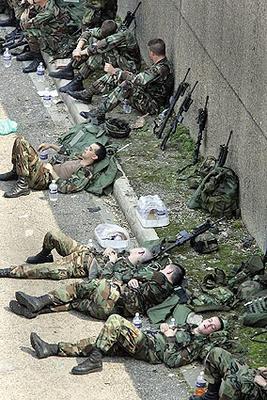
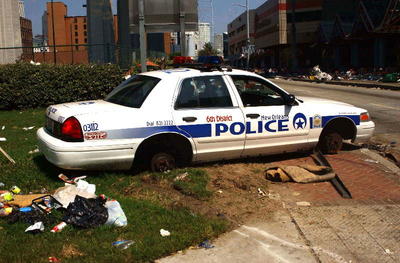
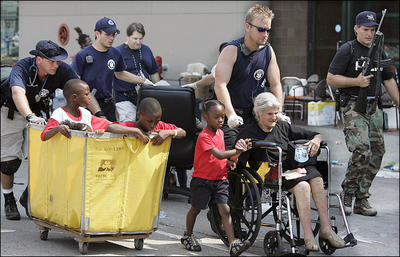
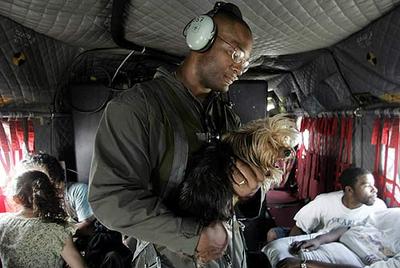
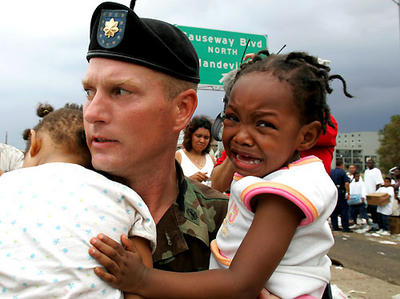
FEMA fuck-ups:
FEMA Accused of Flying Evacuees to Wrong Charleston
FEMA cut phone lines
Fire Fighters Forced to Sit Through FEMA Public Relations Class
FEMA won't accept Amtrak's help in evacuations
FEMA turns away experienced firefighters
FEMA turns back Wal-Mart supply trucks
FEMA prevents Coast Guard from delivering diesel fuel
FEMA won't let Red Cross deliver food
FEMA bars morticians from entering New Orleans
FEMA blocks 500-boat citizen flotilla from delivering aid
FEMA fails to utilize Navy ship with 600-bed hospital on board
FEMA to Chicago: Send just one truck
FEMA: "First Responders Urged Not To Respond"
Clarke continues to spout drivel, this time in front of the EU.
EU states should keep mobile phone and e-mail records for longer to help fight terrorism and crime, Home Secretary Charles Clarke has told MEPs.
Without such measures, European states would be fighting terrorism "with both hands tied behind our backs", he said.
Mr Clarke said telecommunications data proved valuable in the investigation of the London bombings.
He rejected complaints about intrusion into privacy, saying there must be effective protection against abuse.
Mr Clarke also said laws preventing suspects being deported to places where they faced persecution might have to change.
He said he wanted judges to realise of "circumstances in the modern world" when they judging cases involving European human rights laws.
He has not spelt out how long companies should be required to keep records but said "the longer it is held, the better".
EU Justice Commissioner Franco Frattini has said internet data could be kept for six months and phone call details for 12 months across Europe.
In some member states, he said, there are no data retention rules at all.
Mr Clarke hopes to reach a consensus by the end of the UK's EU presidency in December.
In a speech to the European Parliament, Mr Clarke said countries could only fight terror effectively if they knew what the terrorists were saying to each other.
All measures had to be proportionate, with "appropriate safeguards" against abuse and a clear legal basis for exchange of information in each case.
"They will not lead, as some have argued, to the mass surveillance of our citizens or to unnecessary invasion of the citizens' right to privacy," he insisted.
He also wants biometric information included on driving licenses across Europe but he acknowledged the timescale for the change would be "enormous".
The European telecommunications industry will oppose the plans when EU justice ministers in Gateshead later on Wednesday.
The industry says the plans are disproportionate, expensive and ineffective.
Mr Clarke's dossier also calls for a rethink of the European Convention on Human Rights (ECHR).
The convention prevents terror suspects being deported back to countries with poor human rights records.
Mr Clarke says the British judiciary should respect controversial deals being sought with other countries to allow deportation despite poor human rights records.
Critics say such deals cannot guarantee that deported people will not be tortured.
Lib Dem MEPs leader Graham Watson said the human rights convention should not be changed in a "spasm" from recent events.
For a start, telecommunications data only became important once the attacks had taken place, and only to track down the suspect that had fled to Italy. They didn't lead to any further significant arrests. Besides, not having such communications data didn't stop the investigations into Madrid and London from quickly taking place and getting results. The funniest thing instantly follows on Clarke saying that such measures would not lead to surveillance of citizens, with plans to make all driving licenses contain biometric data. Why do driving licenses need such information? They already have a photo, home address and date of birth. What else do they possibly need, other than as a use to follow people's movements?
ISPs and other holders of information have already made the point that such laws to hold information would result in higher charges, and even the possibility the smallest would as a result go bust. In addition to that, the ECC has already said that such data retention laws could be illegal.
The facts of the matter are that Clarke and Blair have still not made a case for European convention on human rights to be changed. They have not managed to convince anyone that suspected extremists deported to states such as Algeria and Jordan will not be tortured or locked away without trial. They haven't even explained why suspects cannot be tried here. The government knows full well that these so-called written agreements will not stand in the European courts. They have set themselves on a collision course with the judges, purely so that they can come across as hardline for the tabloids who denounce any sane rights type ruling. No one is suggesting that a threat doesn't exist in this country or in European from extremists of all ilk; simply that the current proposals will do more harm than good.
Tuesday, September 06, 2005
Hurricane hoedown part three.
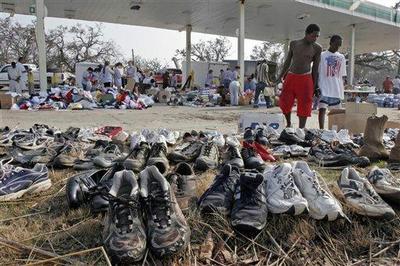

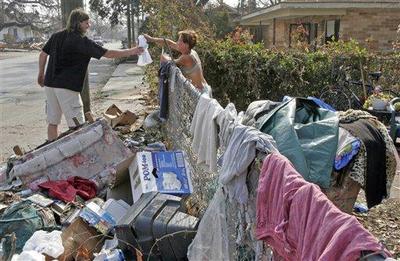
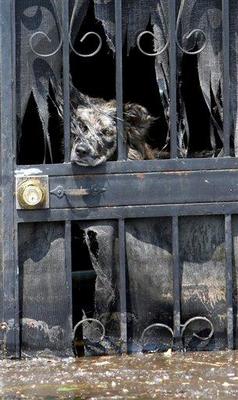
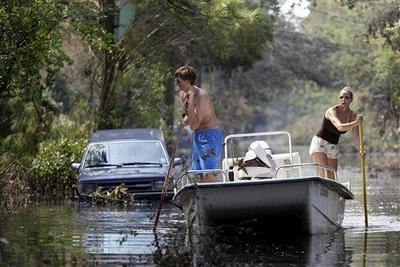
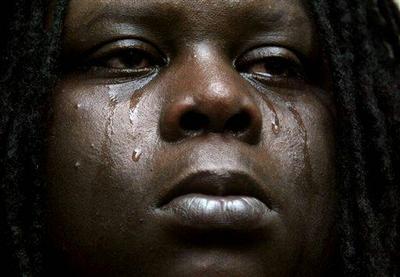
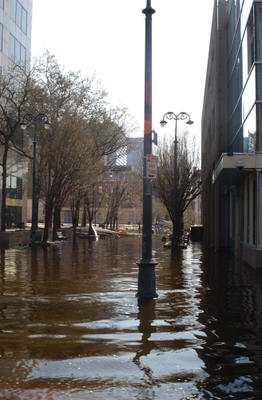
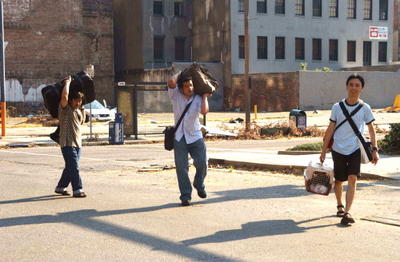
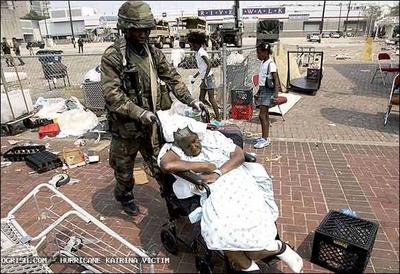
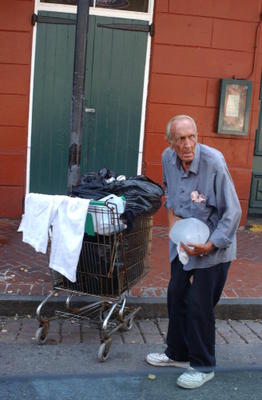
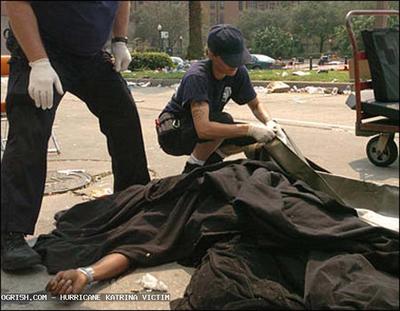
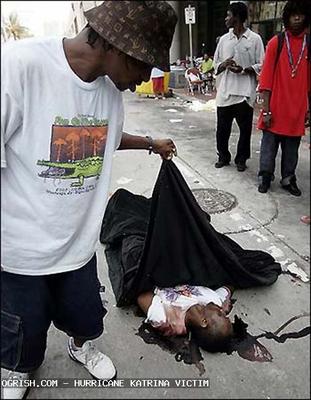

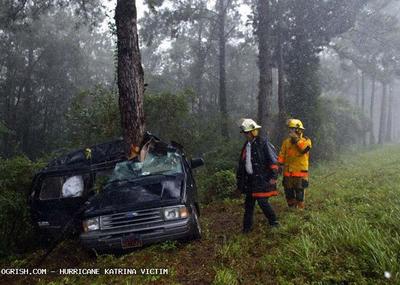
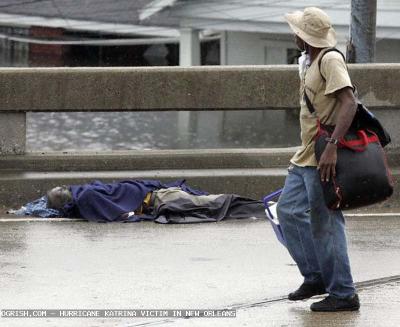
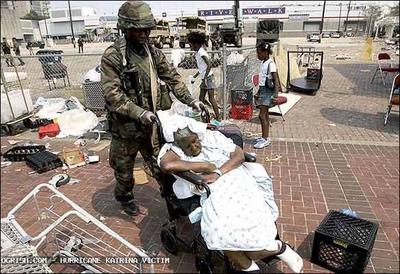
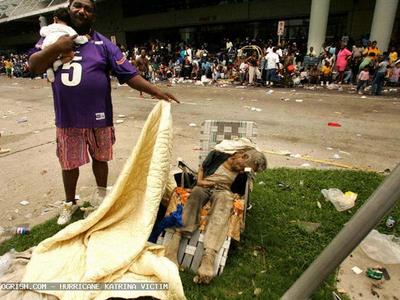
People living in the path of Hurricane Katrina's worst devastation were twice as likely as most Americans to be poor and without a car - factors that may help explain why so many failed to evacuate as the storm approached.
An analysis of census data shows that the three dozen hardest-hit neighbourhoods in Louisiana, Mississippi and Alabama had a disproportionate amount of ethnic minority residents and had incomes $10,000 (£5,427) below the national average.
The analysis showed:
· Median household income in the most devastated neighbourhood was $32,000, or $10,000 less than the national average
· 20% of households in the disaster area had no car, compared with 10% nationwide
· Nearly 25% of those living in the hardest-hit areas were below the poverty line, about double the national average. About 4.5 % in the disaster area received public assistance; nationwide, the number was about 3.5%
· About 60% of the 700,000 people in the three dozen neighbourhoods were from an ethnic minority. Nationwide, about one in three Americans is from a racial minority
· One in 200 American households does not have adequate plumbing. One in 100 households in the most affected areas did not have decent plumbing, which, according to the census, includes running hot and cold water, a shower or bath and an indoor toilet.
· Nationwide, about 7% of households with children are headed by a single mother. In the three dozen neighbourhoods, 12% were single-mother households.
The disparities were even more glaring in large, urban areas. One of the worst-hit neighbourhoods in the heart of New Orleans, for example, had a median household income of less than $7,500. Nearly three of every four residents fell below the poverty line, and barely one in three people had a car.
There is a similar picture in Mississippi. In one Pascagoula neighbourhood, where 30% of residents are minorities, more than 20% live in poverty.
In Alabama, where Katrina was not as severe, one of the hardest-hit areas was a downtown Mobile neighbourhood, where the median household income is barely $25,000 and one in every four residents lives below the poverty line.
More loyalist agitation goes on without condemnation.
It began late one night when Kathleen McCaughey's front door was kicked down by two men who stormed up the stairs shouting: "Taigs out."
"Aren't you going to call me an Orange bastard?" asked one of the men when Mrs McCaughey, 51, who has epilepsy, came out of her bedroom in her dressing gown.
After five months of attacks including petrol and paint bombs and a poster campaign calling her a republican scrounger, she was given a few hours to clear her house and leave the village of Ahoghill in Ian Paisley's North Antrim constituency.
Protestant children had been paid £5 each to sit on her front lawn banging drums until she caved in. If she did not go, she was told, her row of houses would be burned down.
The town of Ballymena and its surrounding villages are in the grip of the worst wave of anti-Catholic sectarian attacks for years and the police have been forced to adopt the same tactics as the UN uses in Kosovo: guarding Catholic churches, schools and Gaelic sports clubs at night to stop them being torched.
Northern Ireland is slipping into the kind of civil strife where people cannot tolerate the presence of their neighbours, and it is being demonstrated at primary schools. Two Catholic schools in the area were burned in arson attacks within 24 hours last week. The head of Northern Ireland's community relations council has said the police patrols are unsustainable, adding that many people would soon start to feel they could only live in Ballymena with UN-style protection.
Mr Paisley, who has always talked about his unbiased dedication to the Catholics in his constituency, was accused of moral cowardice and a lack of leadership. He returned from holiday and condemned the attacks last week but complained that, in the past, attacks on his church headquarters in Belfast had not been condemned by Sinn Féin.
Mark Durkan, the SDLP's leader, accused loyalist paramilitaries from the Ulster Defence Association of orchestrating sectarian violence in north Antrim.
Police said it was more complex than a coordinated campaign against Catholics, adding that teenagers and young boys had been involved. A 13-year-old boy has been charged with arson following last week's attack on St Louis' primary school which destroyed one classroom and damaged 10 others. A 15-year-old is also being questioned. Police have recorded 28 significant attacks against Catholics, including two attempted murders, and 14 attacks against Protestants.
In the nearby, predominantly Protestant, suburb of Harryville, the Catholic church has been repeatedly paint bombed and daubed with slogans such as "Fuck the Pope" over the summer.
A report by the Institute for Conflict Research shows that following the Good Friday Agreement in 1997, sectarian violence has increased, with more attacks on churches, Gaelic sports clubs and Orange halls than before the ceasefires of 1994.
There have been sectarian attacks on both side of the divide in north and east Belfast throughout the summer.
Dennis Bradley, the former Catholic priest who brokered the first ceasefire and is now a member of the policing board, said police alone could not solve the problem of the sectarian attacks, which he blamed on the "nihilism of 14-, 15-, 16-year-olds" and "20- and 30-year-olds who are quite sectarian in the sense that they cannot live with their neighbours".
Other research recently has shown that children as young as five or six are displaying bigoted ideas.
A generation is growing up more segregated and sectarian than its parents.
This is about more than just the peace process, the IRA and the DUP. That the loyalist and republican communities are growing up and teaching their kids to be bigoted by the age of 5 and 6 shows that something is badly going wrong. It seems incomprehensible to me that two groups who supposedly believe in the same God can be at war at each other in 2005. It's not just a failure of leadership and condemnation by the leading politicians, it's their petty radicalism and intolerance which is adding fuel to the fire. The distasteful Ian Paisley, a religious extremist if there ever was one, continues to lead the biggest politicial party, and is welcomed with hand shakes at 10 Downing Street. Gerry Adams and the other Sinn Fein MPs still do not take their seats.
What this amounts to is if not ethnic cleansing, religious cleansing. Most of all though, it's the same loyalists who are attacking catholics who are demanding that the IRA take photographs of them destroying their weapons, while they run around setting fire to churches. It's an endless cycle of stupidity, and I can't see it ending for a long time yet.
Monday, September 05, 2005
John Humphrys tells the truth and gets attacked for it.
The BBC Radio 4 Today presenter John Humphrys has hit back at allegations that he disparaged senior Labour politicians in an after-dinner speech by implying that all ministers are liars.
Yesterday the BBC announced that it had asked for a full transcript of Humphrys' remarks to the Commercial Directors' Forum on June 8 amid newspaper claims that he had used the speech to pour scorn on Tony Blair, Gordon Brown, John Prescott, Peter Mandelson and Alastair Campbell.
In a video and transcript of the speech published on the Times website, Humphrys is reported as saying that some MPs "couldn't give a bugger whether they lie or not", and mocking the chancellor as "easily the most boring political interviewee I have ever had in my whole bloody life".
Humphrys also refers to Mr Brown, who lost sight in his left eye after being kicked in a school rugby game, as winking at him from "his one good eye" during a Today interview and pokes fun at Mr Prescott's habit of mangling familiar phrases, saying people "can't understand a bloody word he says".
Yesterday, Humphrys hit back at the Times report, saying it was "disgraceful" for the newspaper to suggest that his remarks were intended to imply that all ministers were liars.
"It's not what I believe and never have done," he told the Guardian.
Humphrys claimed the newspaper and its stablemate, the Sunday Times, which carried a similar report yesterday, had "conflated" a series of remarks he had made about politicians.
"What I actually said was that there are three kinds of politicians: those who do not lie full stop, those who lie if they absolutely have to, and those who do not give a bugger about lying," said Humphrys.
In one section of his speech Humphrys reportedly refers to the row over the Andrew Gilligan affair, telling his after-dinner audience that the former Radio 4 reporter's controversial claims that Downing Street deliberately inserted false information to "sex up" intelligence in Iraq, were substantially true.
"The fact is that we got it right," he is heard to say.
Humphrys also describes Mr Campbell, who led the government's attacks on Gilligan and Today, as "a pretty malevolent force" and pokes fun at an interview Cherie Blair gave to the Sun during the last general election in which she hinted at her husband's sexual stamina.
John Humphrys is often described as one of the BBC's interview "attack-dogs", the kind that actually do grill politicans over their policies and occasionally get the better of them. Along with Jeremy Paxman, he's one of the two presenters at the BBC actually worth listening/watching. It comes as no surprise that the newspaper behind these allegations is the Times. (Prop. R. Murdoch, certainly no friend of the BBC)
The worst thing about this is that John Humphrys was not only telling the truth mostly, he always speaking his mind, which is one of the things few politicians actually decide to do very often. John Prescott does mangle his words, and is occasionally incomprehensible. He himself admits so. Robin Cook on an appearance on Newsnight before the start of the war against Iraq defended the government position when it was clear shortly afterwards that he had been against the conflict from the very beginning, clearly an example of how ministers follow the party line when they disagree, as Humphrys states. Gordon Brown is depicted as being dry and wallowing in self-pity, as many politicians have in the past always said. The now infamous Andrew Gilligan report about "sexing up" the weapons dossier, along with the fourty-five minute claim, have now despite the Hutton report lambasting the BBC, been shown to almost completely correct. Finally, who wouldn't make fun of Cherie and Tony Blair's excruciating interview in the Sun (Prop. R. Murdoch.) just before the election when she claimed that they had sex five times a night and that he had a great physique? Both Private Eye and the Guardian had huge fun with it.
Pretty much all of these supposedly 'scathing' and 'inflammatory' remarks are old news or been made numerous times before. So why now have these remarks been so well publicised? While the silly season is drawing to a close, it's not like we've had no news worth reporting. I seem to remember there being some extreme weather in America that may have killed some people. Apart from that, I'm also suspicious of this being in the Times. There have been reports that Channel 4 might end up turning to Sky News for its news bulletins, as Channel 5 already has. That would leave ITV with its often execrable ITN coverage, and the BBC with its usually fine coverage. In other words, it seems to me as if Sky (Prop. R. Murdoch.) is already going on the offensive. If it wasn't for Ofcom's rules on impartiality, Murdoch would have already transformed Sky News into a British version of Fox.
John Humphrys isn't completely spotless, it has to be said. He has a large amount of shares in YouGov, the internet polling company which has suspiciously often led broadcasts on the Today programme. He often also takes large fees for corporate speaking. Aside from that though, he's one of the few in the television/radio journalism section of the media that is prepared to fight through the spin. The attack on him is typical not only of the way New Labour is becoming increasingly intolerant of mainstream criticism, but also of the way, post-Hutton, that the BBC has decided to roll over and play dead when invective is thrown against it.
About
- This is septicisle
Links
- Bloggerheads
- The Sun - Tabloid Lies
- Liberal Conspiracy
- Lenin's Tomb
- D-Notice
- Daily Mail/Express Watch
- Councillor Bob Piper
- Craig Murray
- Comment is Free
- Rachel from North London
- Straight to the Point
- Paul Linford
- The Ministry of Truth
- Mask of Anarchy
- Osama Saeed - Rolled-up Trousers
- Pickled Politics
- Stop the BNP
- Post Hegemony
- George Monbiot
- Melon Farmers
- Jews Sans Frontieres
- Blood & Treasure
- Five Chinese Crackers
- Chicken Yoghurt
- tygerland.net
- Action on Rights for Children
- Jailhouselawyer
- Nosemonkey
- Between the Hammer and the Anvil
- Mr Eugenides
- Tampon Teabag
- Retired Rambler
- Politaholic
- Stumbling and Mumbling
- Ten Percent
- Iraq Dossier - Blog
- Bill's Comment Page
- Mike Power
- Unrepentant Communist
- A Very Public Sociologist
- Though Cowards Flinch
- Socialist Unity
- Dave's Part
- Shiraz Socialist
- Leftwing Criminologist
- Through the Scary Door
- Dirty Leftie
- Konichiwa, Bitches
- Eric the Fish
- Mad Ranter
- Qwghlm
- Chris Paul - Labour of Love
- Capital D
- Sim-O's Random Thoughts
- Mediawatchwatch
- Never Trust a Hippy
- Pigdogfucker
- Rhetorically Speaking
- Enemies of Reason
- Griffindor - Lee Griffin
- Bleeding Heart Show
- Hopi Sen
- Transform
- anticant
- Love and Garbage
- Cynical Dragon
- Tory Troll
- Wardman Wire
- The Daily (Maybe)
- The Curmudgeon
- Greenman's Occasional Organ
- Freemania
- openDemocracy - OurKingdom
- Penny Red
- Yorkshire Ranter
- Dave Cole
- Heresy Corner
- Back Towards The Locus
- Daily Quail
- Spy Blog
- Alix Mortimer
- Scribo Ergo Sum
- Westminster Wisdom
- Robert Sharp
- John B
- Angry Mob
- Blurred Clarity
- Hagley Road to Ladywood
- No Sleep 'Til Brooklands
- Stirring Up Apathy
- Tabloid Watch
- The Lay Scientist
- Next Left
- Third Estate
- Sadie's Tavern
- Don Paskini
- Harpymarx
- Splintered Sunrise
- The Polemical Report
- Bad Science
- Pavlov's Cat
- Merry Winterval!
- Shorter David Willetts.
- Season's greetings from the UK Border Agency redux...
- Scum-watch: This man deserved brain damage.
- Weekend links.
- The TRUTH strikes back.
- The BBC is spineless, yet again.
- Barry George and the News International smear merc...
- The ghost of Labour future.
- The political zzz factor.
- 10/07/2005
- 17/07/2005
- 24/07/2005
- 31/07/2005
- 07/08/2005
- 14/08/2005
- 21/08/2005
- 28/08/2005
- 04/09/2005
- 11/09/2005
- 18/09/2005
- 25/09/2005
- 02/10/2005
- 09/10/2005
- 16/10/2005
- 23/10/2005
- 30/10/2005
- 06/11/2005
- 13/11/2005
- 20/11/2005
- 27/11/2005
- 04/12/2005
- 11/12/2005
- 18/12/2005
- 25/12/2005
- 01/01/2006
- 08/01/2006
- 15/01/2006
- 22/01/2006
- 29/01/2006
- 05/02/2006
- 12/02/2006
- 19/02/2006
- 26/02/2006
- 05/03/2006
- 12/03/2006
- 19/03/2006
- 26/03/2006
- 02/04/2006
- 09/04/2006
- 16/04/2006
- 23/04/2006
- 30/04/2006
- 07/05/2006
- 14/05/2006
- 21/05/2006
- 28/05/2006
- 04/06/2006
- 11/06/2006
- 18/06/2006
- 25/06/2006
- 02/07/2006
- 09/07/2006
- 16/07/2006
- 23/07/2006
- 30/07/2006
- 06/08/2006
- 13/08/2006
- 20/08/2006
- 27/08/2006
- 03/09/2006
- 10/09/2006
- 17/09/2006
- 24/09/2006
- 01/10/2006
- 08/10/2006
- 15/10/2006
- 22/10/2006
- 29/10/2006
- 05/11/2006
- 12/11/2006
- 19/11/2006
- 26/11/2006
- 03/12/2006
- 10/12/2006
- 17/12/2006
- 24/12/2006
- 31/12/2006
- 07/01/2007
- 14/01/2007
- 21/01/2007
- 28/01/2007
- 04/02/2007
- 11/02/2007
- 18/02/2007
- 25/02/2007
- 04/03/2007
- 11/03/2007
- 18/03/2007
- 25/03/2007
- 01/04/2007
- 08/04/2007
- 15/04/2007
- 22/04/2007
- 29/04/2007
- 06/05/2007
- 13/05/2007
- 20/05/2007
- 27/05/2007
- 03/06/2007
- 10/06/2007
- 17/06/2007
- 24/06/2007
- 01/07/2007
- 08/07/2007
- 15/07/2007
- 22/07/2007
- 29/07/2007
- 05/08/2007
- 12/08/2007
- 19/08/2007
- 26/08/2007
- 02/09/2007
- 09/09/2007
- 16/09/2007
- 23/09/2007
- 30/09/2007
- 07/10/2007
- 14/10/2007
- 21/10/2007
- 28/10/2007
- 04/11/2007
- 11/11/2007
- 18/11/2007
- 25/11/2007
- 02/12/2007
- 09/12/2007
- 16/12/2007
- 23/12/2007
- 30/12/2007
- 06/01/2008
- 13/01/2008
- 20/01/2008
- 27/01/2008
- 03/02/2008
- 10/02/2008
- 17/02/2008
- 24/02/2008
- 02/03/2008
- 09/03/2008
- 16/03/2008
- 23/03/2008
- 30/03/2008
- 06/04/2008
- 13/04/2008
- 20/04/2008
- 27/04/2008
- 04/05/2008
- 11/05/2008
- 18/05/2008
- 25/05/2008
- 01/06/2008
- 08/06/2008
- 15/06/2008
- 22/06/2008
- 29/06/2008
- 06/07/2008
- 13/07/2008
- 20/07/2008
- 27/07/2008
- 03/08/2008
- 10/08/2008
- 17/08/2008
- 24/08/2008
- 31/08/2008
- 07/09/2008
- 14/09/2008
- 21/09/2008
- 28/09/2008
- 05/10/2008
- 12/10/2008
- 19/10/2008
- 26/10/2008
- 02/11/2008
- 09/11/2008
- 16/11/2008
- 23/11/2008
- 30/11/2008
- 07/12/2008
- 14/12/2008
- 21/12/2008
- 28/12/2008
- 04/01/2009
- 11/01/2009
- 18/01/2009
- 25/01/2009
- 01/02/2009
- 08/02/2009
- 15/02/2009
- 22/02/2009
- 01/03/2009
- 08/03/2009
- 15/03/2009
- 22/03/2009
- 29/03/2009
- 05/04/2009
- 12/04/2009
- 19/04/2009
- 26/04/2009
- 03/05/2009
- 10/05/2009
- 17/05/2009
- 24/05/2009
- 31/05/2009
- 07/06/2009
- 14/06/2009
- 21/06/2009
- 28/06/2009
- 05/07/2009
- 12/07/2009
- 19/07/2009
- 26/07/2009
- 02/08/2009
- 09/08/2009
- 16/08/2009
- 23/08/2009
- 30/08/2009
- 06/09/2009
- 13/09/2009
- 20/09/2009
- 27/09/2009
- 04/10/2009
- 18/10/2009
- 25/10/2009
- 01/11/2009
- 08/11/2009
- 15/11/2009
- 22/11/2009
- 29/11/2009
- 06/12/2009
- 13/12/2009
- 20/12/2009
